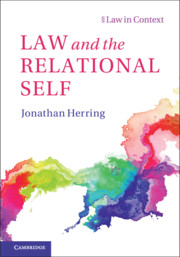Book contents
- Law and the Relational Self
- The Law in Context Series
- Law and the Relational Self
- Copyright page
- Contents
- Acknowledgements
- Table of Cases
- Table of Legislation
- 1 The Concept of the Relational Self
- 2 Law and the Vulnerable Self
- 3 Law and the Caring Self
- 4 Law and the Abused Self
- 5 Medical Law and the Relational Self
- 6 Family Law and the Relational Self
- 7 Criminal Law and the Relational Self
- 8 Concluding Thoughts
- Index
1 - The Concept of the Relational Self
Published online by Cambridge University Press: 15 November 2019
- Law and the Relational Self
- The Law in Context Series
- Law and the Relational Self
- Copyright page
- Contents
- Acknowledgements
- Table of Cases
- Table of Legislation
- 1 The Concept of the Relational Self
- 2 Law and the Vulnerable Self
- 3 Law and the Caring Self
- 4 Law and the Abused Self
- 5 Medical Law and the Relational Self
- 6 Family Law and the Relational Self
- 7 Criminal Law and the Relational Self
- 8 Concluding Thoughts
- Index
Summary
This chapter explores the concept of the relational self. It contrasts it with the traditional understanding of the indivdiualised self. It argues that the model of the relational self captures the sense that our identity, language and ways of understanding the world come from our relationships. It explores how the law has been based on an individualised self through, for example, emphasising autonomy. It argues that the law should adopt a relational understanding of the self.
- Type
- Chapter
- Information
- Law and the Relational Self , pp. 1 - 23Publisher: Cambridge University PressPrint publication year: 2019

